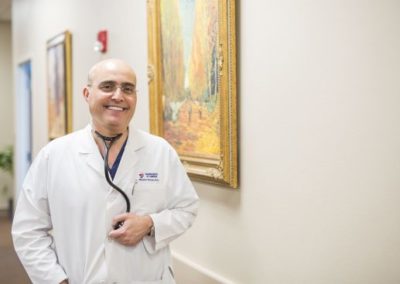Cardiovascular Services
Lubbock Heart & Surgical Hospital
Cardiovascular Services
Lubbock Heart & Surgical Hospital provides advanced cardiovascular care using the latest technology and surgical techniques. Our board-certified specialists diagnose and treat a wide range of heart and vascular conditions, offering minimally invasive options that promote faster recovery and lasting results.
Electrophysiology
Electrophysiology focuses on diagnosing and treating heart rhythm disorders (arrhythmias). Using tools such as electrocardiograms (ECGs) and electrophysiology studies (EPS), specialists evaluate the heart’s electrical activity to pinpoint irregular rhythms.
Treatment options include medication, catheter ablation, and the implantation of pacemakers or defibrillators. Catheter ablation, a minimally invasive procedure, uses targeted energy to eliminate small areas of heart tissue causing abnormal rhythms.
These treatments restore normal heart rhythm, relieve symptoms such as palpitations and fatigue, and reduce the risk of complications like stroke or heart failure.
Cardioversion
Cardioversion restores a normal heart rhythm for patients with arrhythmias such as atrial fibrillation. It can be performed using controlled electrical impulses or medication.
This quick, effective procedure improves heart efficiency, reduces symptoms, and lowers the risk of stroke and other complications.
Pacemaker and Defibrillator Insertion
Pacemakers and implantable defibrillators help regulate or restore normal heart rhythm. Pacemakers correct slow heartbeats (bradycardia), while defibrillators detect and correct dangerous arrhythmias by delivering controlled shocks.
Cardiothoracic Surgery
Cardiothoracic surgery treats conditions of the heart, lungs, and major blood vessels to restore function and improve circulation.
Common procedures include:
- Coronary Artery Bypass Grafting (CABG): Bypasses blocked arteries to restore
blood flow to the heart. - Heart Valve Repair and Replacement: Repairs or replaces damaged valves to
maintain efficient blood circulation. - Surgery for Congenital Heart Defects: Corrects structural abnormalities present
from birth to improve heart performance.
Our surgeons often use minimally invasive and robotic-assisted techniques, which may reduce pain, shorten hospital stays, and speed recovery. These surgeries help improve heart function, prevent complications, and enhance quality of life.
Angioplasty and Angiograms
Angiograms and angioplasty are minimally invasive procedures used to diagnose and treat coronary and peripheral artery disease.
An angiogram involves injecting contrast dye to visualize narrowed or blocked arteries, whether in the heart or elsewhere in the body, on X-ray images. If a blockage is found, angioplasty may follow, using a small balloon to widen the artery. Often, a stent is placed to keep the vessel open and maintain blood flow.
These procedures restore healthy circulation, relieve pain or discomfort caused by restricted blood flow, and lower the risk of heart attack, stroke, or limb complications.
Coronary Stents
Coronary stents are small mesh tubes placed in arteries after angioplasty to keep them open and prevent re-narrowing (restenosis). Stents maintain continuous blood flow to the heart, reducing chest pain and lowering the risk of heart attack.
Lubbock Heart & Surgical Hospital uses advanced drug-eluting stents that release medication to prevent scar tissue buildup and ensure long-term results.
Transcatheter Aortic Valve Replacement (TAVR)
TAVR offers a less invasive alternative to open-heart surgery for patients with severe aortic stenosis. Through a small incision—usually in the groin—a new valve is inserted via catheter to replace the diseased one.
This approach reduces recovery time, improves heart function, and relieves symptoms such as fatigue and shortness of breath.
Venous Compression Stenting
Venous compression stenting treats blockages caused by chronic venous insufficiency. A stent is placed in the affected vein to restore blood flow, reducing swelling, pain, and discomfort.
This procedure helps improve circulation and overall vascular health.
Renal Denervation
Renal denervation is a minimally invasive treatment for resistant hypertension—high blood pressure that remains uncontrolled despite medication. The procedure uses radiofrequency energy to disrupt overactive nerves in the renal arteries, improving blood pressure control and reducing medication dependence.
Vascular Surgery
Vascular surgery addresses diseases of the circulatory system, including aneurysms, carotid artery disease, and peripheral artery disease (PAD). Procedures are designed to improve blood flow, prevent complications like stroke, and reduce pain or fatigue caused by poor circulation.
Minimally invasive techniques are often used to enhance recovery and long-term outcomes.
Lubbock Heart & Surgical Hospital offers a full spectrum of cardiovascular treatments—from advanced diagnostics such as electrophysiology to complex surgical interventions including cardiothoracic and vascular procedures. Our specialists are dedicated to delivering precise, effective care that improves heart health and quality of life. For more information or to schedule an appointment, call 806-687-7777. Your heart health is our priority, and we’re here to support you throughout your care.








